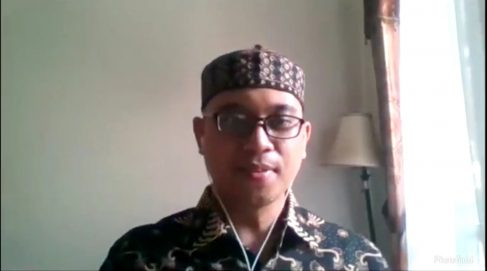The Management Department of FEB UI Held a Workshop on Achieving Learning Goals and Objectives in Distance Learning
Nino Eka Putra ~ PR of FEB UI
DEPOK – (25/11/2020) Harry Budi Santoso, Ph.D., Head of the Digital Library and Distance Learning Lab Fasilkom UI, Member of the UI E-Learning Monev Team, Former Director of E-Learning Development Aptikom as a resource person for the Workshop on Learning Goals Achievement and Objectives in Distance Learning (PJJ) on Wednesday (25/11/2020). This workshop was initiated by the Management Department of FEB UI and opened by Dony Abdul Chalid, Ph.D., Chair of the Management Department of FEB UI.
In his presentation, Harry said that the achievement of learning goals and objectives in the context of online learning cannot be separated from the alignment between assessment strategies and learning activities with learning outcomes. PJJ requires serious thought and attention considering that its implementation cannot be equated with conventional learning. During this pandemic, we have been carrying out full online learning since the middle of last semester (Even 2020). We can use this period to reflect on the online learning that we have done before and enrich the lessons learned in implementing PJJ.

Aspects of online pedagogy and instructional design are formulated before deciding which technology to use. The formulation was designed by the lecturer as subject-matter experts. Of course, it is also good if instructional designers can be involved and work closely with fellow lecturers in a scientific field.
Harry added that in the current full online learning period, we are strongly encouraged to build and maintain quality engagement with students in a different format than before. Lecturers in carrying out their duties have expectations that students are truly “present” and active even though they are separated physically, space, and time through technology. On the other hand, students also have expectations of being facilitated by lecturers in carrying out the Distance Learning (PJJ) process. This is where we can see the relevance of active learning and student-centered learning.
Meanwhile, regarding assessment in the implementation of PJJ, teachers are given the opportunity to review it so that the assessment strategy can execute well and be relevant, especially assessment in the context of PJJ using technology. Harry also conveyed interesting points as material for joint thoughts from an article published on the World Economic Forum (WEF) website entitled “Will COVID-19 Spell the end for Exams?” This article was written by Conrad Hughes and published on the WEF website on 30 June 2020.
“In organizing PJJ, Universitas Indonesia uses a learning management system application known as E-Learning Management Systems (EMAS). This application is used to facilitate the learning process online. Through this application, lecturers can post or upload lecture materials, give quizzes or assignments, use the report facility to monitor student activities while using EMAS, and others. In addition, to build interaction between lecturers and students, asynchronous discussion forum facilities and synchronous chatting can be used. Of course, there are many other applications that can be used to facilitate interaction between lecturers and students synchronously and face-to-face through Zoom, Microsoft Teams, Google Meet, and other products, both proprietary and open source based,” said Harry closing the session. (hjtp)
(am)




